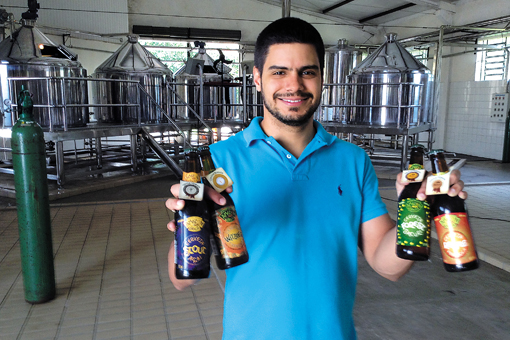The high wall that separates Amazon Beer’s brewery and bottling plant from the teeming jungle hardly holds back the snakes, monkeys and giant hairy spiders. But invasive animals are only one of the challenges faced by Arlindo Guimarães and his son Caio in developing the only craft brewery in the Amazon.
“A lot of people thought my dad was crazy,” says Caio, 27, as he leads me on a tour of the plant in Belém, capital of Brazil’s vast northwestern state of Pará. It’s easy to see why they might think so. The jungle’s intense heat and humidity affect the fermentation process and suck flavor from beers. Moreover, the notoriously bad roads in one of Brazil’s poorest regions create a logistics nightmare. And perhaps even more off-putting: while Brazil ranks fourth worldwide in beer consumption, most Brazilians drink watery mass-market beers.
But these challenges, further complicated by the high Brazilian taxes that absorb earnings, failed to deter Arlindo, 55, who has a background in software technology and founded Amazon Beer as a small brewery and brewpub in 2000. As Caio, who joined him in 2004, explained, his father’s travels exposed him to the pleasure—and profit potential—of craft beer in the U.S. and Europe. “He read that these types of companies are growing fast. He thought it was worth trying in Brazil. And I think he was right.”
The Guimarães’ gamble paid off. Today, Amazon Beer produces 120,000 liters a month, with another 60,000 liters capacity to come online in 2015. Profit was about 10 million reais ($3.8 million) in 2013—and the company has grown fast as demand for craft beer rises with the expanding Latin American middle class. In March 2014, the U.K.-based distributor World Beers began bottling Amazon Beer out of northern England and distributing it to six European countries. “It’s got all the ingredients to be a real cult brand,” says World Beers owner Peter Karsten.
New brewers seem to be popping up almost overnight across the region, and investors are taking notice. Japanese company Kirin in 2013 purchased microbreweries Devassa (Rio de Janeiro), Baden Baden (São Paulo), and Eisenbahn (Blumenau). But even as other microbrewers are establishing a similar international presence, Amazon Beer occupies a special niche: it uses ingredients found only in the jungle.
Its Belgian wheat beer, for instance, is brewed with taperabá (which tastes like a cross between mango and orange). The company also makes a red ale with priprioca (a woody herb), a lager with bacuri (a rare aromatic fruit), and an açaí stout that was named Brazil’s best beer in 2014. Arlindo and Caio are seeking approval to export to the U.S. (though Coumarou Ale, which contains the natural blood thinner warfarin, is unlikely to get approval).
Meanwhile, at home, branding—as well as a reliable sales base from one of Brazil’s oldest craft brewpubs—may be the key to winning over Brazilians accustomed to drinking cheaper mainstream beers. Arlindo and Caio tapped noted Chicago-based graphic artist Randy Mosher to design the beer’s signature label, featuring a monkey swinging beneath the word “Amazon.” They also sought input from noted brewers such as Pete Slosberg of Pete’s Wicked Ale, who is a founder of South America’s annual South Beer Cup. “I was blown away, it was so refreshing,” Slosberg says of his first taste.
Though there are still challenges, Caio is sure that there’s a market for his product, even among discriminating beer lovers. “My dream is to go to a New York City bar and order an Amazon Beer,” he says.



